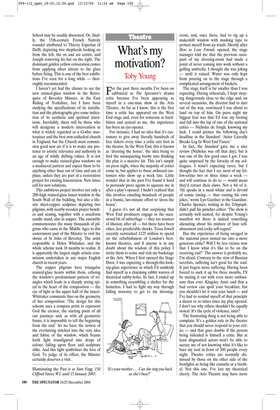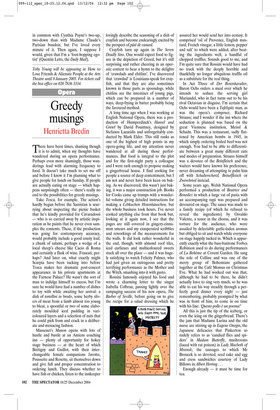What’s my motivation?
Toby Young
For the past three months I’ve been on sabbatical as The Spectator’s drama critic because I’ve been appearing as myself in a one-man show at the Arts Theatre. As far as I know, this is the first time a critic has appeared on the West End stage and, even for someone as hardbitten and cynical as me, the experience has been an eye-opener.
For instance, I had no idea that it’s customary to give away literally hundreds of free tickets every time a critic sets foot in the theatre. In the West End, this is known as ‘dressing the house’, the idea being to fool the unsuspecting booby into thinking the play is a massive hit. This isn’t simply on press night, when the majority of critics come in, but applies to those awkward customers who show up a week late. Little wonder that in the past I’ve found it hard to persuade press agents to squeeze me in after a play’s opened. I hadn’t realised that this involves emailing hundreds of people in a frantic, last-minute effort to ‘dress the house’.
I guess it’s not all that surprising that West End producers engage in the occasional bit of subterfuge — they are masters of illusion, after all — but there have been other, less predictable shocks. Tessa Jowell recently earmarked £125 million to spend on the refurbishment of London’s bestknown theatres, and if anyone is in any doubt about the wisdom of this policy I invite them to come and visit me backstage at the Arts. When I first opened the Stage Door, I was expecting a through-the-looking-glass experience in which I’d suddenly find myself in a charming rabbit warren of theatrical cubby-holes. In fact, I ended up in something resembling a shelter for the homeless. I had to fight my way through falling masonry to get to my dressing room, and, once there, had to rig up a makeshift window with masking tape to protect myself from icy winds. Shortly after How to Lose Friends opened, the stage manager told me that the previous occupant of my dressing-room had made a point of never coming into work without a golfing umbrella. I thought she was joking — until it rained. Water was only kept from pouring on to the stage through a complicated arrangement of buckets.
The stage itself is far smaller than I was expecting. During rehearsals, I kept straying dangerously close to the edge and, on several occasions, the director had to dart out of the way, convinced I was about to land on top of him. On press night my biggest fear was that I’d lose my footing and fall into the lap of one of the national critics — Nicholas de Jongh, knowing my luck. I could picture the following day’s headline in the Standard: ‘Actor Literally Breaks Leg In West End Fiasco.’ In fact, the Standard gave me a nice review (Nicholas was off that day), but it was one of the few good ones I got. I was quite surprised by the ferocity of my colleagues. I wasn’t expecting raves, but I thought the fact that I see most of my fellow-critics two or three times a week and will continue to do so — would mean they’d retract their claws. Not a bit of it. ‘He speaks in a nasal whine and is devoid of comic timing — thus ruining his own jokes,’ wrote Lyn Gardner in the Guardian. Charles Spencer, writing in the Telegraph, didn’t pull his punches either: ‘The show is certainly well named, for despite Young’s manifest wit there is indeed something alienating about his mixture of faux selfabasement and cocky self-regard.’ Has the experience of being savaged in the national press turned me into a more generous critic? Will I be less vicious now that I know what it’s like to be on the receiving end? The answer is probably no, I’m afraid. Contrary to the view of Russian novelists, suffering isn’t good for the soul. It just begets more suffering. Having been forced to suck it up for three months, I’ll be meting it out with even more enthusiasm than ever. Kingsley Amis said that a bad review can spoil your breakfast, but you shouldn’t let it ruin your lunch — and I’ve had to remind myself of that principle a dozen or so times since my play opened. I don’t see why others shouldn’t be equally stoical. It’s the cycle of violence, innit?
The frustrating thing is not being able to complain. It’s a golden rule in the theatre that you should never respond to your critics — and that goes double if the person being ridiculed is himself a critic. But at least disgruntled actors won’t be able to accuse me of not knowing what it’s like to bare my soul in front of 300 people every night. Theatre critics are normally dismissed by those on the other side of the footlights as being like eunuchs at a brothel. Not this one. I’ve lost my theatrical cherry. The Arts Theatre may have more in common with Cynthia Payne’s two-up, two-down than with Madame Claude’s Parisian boudoir, but I’ve loved every minute of it. Then again, I suppose I would, given that I’m a ‘foot-hopping egotist’ (Quentin Letts, the Daily Mail).


















































































 Previous page
Previous page